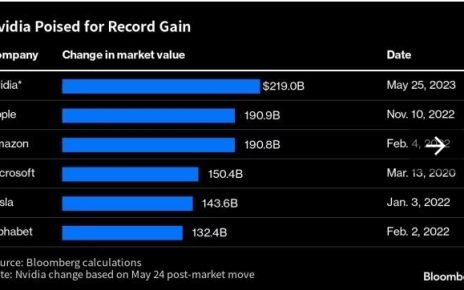The United States Faces a $48 Trillion Moment of Truth This Decade, McKinsey Says: Navigating an Economic Paradigm Shift
Introduction:
The United States finds itself at a critical juncture, as a recent report by McKinsey & Company reveals a looming economic challenge of unprecedented proportions. According to their analysis, the nation must confront a $48 trillion “moment of truth” over the course of this decade. This daunting figure represents a confluence of complex factors that demand urgent attention and strategic planning.
Understanding the Challenge:
At the heart of this fiscal reckoning lies a combination of long-standing economic issues that have been exacerbated by recent events. McKinsey’s report highlights four key interrelated challenges: soaring healthcare costs, mounting national debt, rising income inequality, and the disruptive impact of technological advancements.
1. Soaring Healthcare Costs:
Healthcare expenditure has been on a relentless upward trajectory in the United States, outpacing inflation for decades. McKinsey’s analysis predicts that by 2030, healthcare expenses will surge to an astonishing 19% of the nation’s GDP, putting immense strain on public and private budgets. Tackling this issue will require a comprehensive approach, focusing on cost control, improved efficiency, and innovative healthcare delivery models.
2. Mounting National Debt:
The United States’ national debt has been steadily increasing for years, reaching staggering levels. The COVID-19 pandemic further exacerbated the situation as the government deployed significant fiscal stimulus measures to mitigate its impact. McKinsey estimates that the national debt could surpass $40 trillion by 2030, creating potential risks for the economy and future generations. A careful balance between prudent fiscal management and strategic investments will be crucial to address this challenge.
3. Rising Income Inequality:
Income inequality has become a defining issue in the United States, with disparities reaching historic levels. McKinsey’s report emphasizes that addressing this issue is not only a matter of fairness but also crucial for sustainable economic growth. Enhancing access to quality education, promoting social mobility, and implementing targeted policies to reduce inequality will be vital in fostering an inclusive and prosperous society.
4. Technological Advancements:
The rapid pace of technological advancements is transforming industries, labor markets, and society at large. While technology holds immense potential for economic growth and increased productivity, it also poses significant challenges. Automation and artificial intelligence have the potential to disrupt traditional employment models and exacerbate income inequality. The United States must navigate this transformational landscape by investing in reskilling and upskilling programs, fostering innovation, and ensuring a smooth transition for workers.
Strategic Imperatives:
To overcome the $48 trillion moment of truth, the United States needs a comprehensive and integrated approach. McKinsey suggests several key strategic imperatives to address the challenges ahead:
1. Fiscal Responsibility:
The government must adopt responsible fiscal policies that strike a balance between stimulating economic growth, reducing the national debt, and investing in critical areas such as infrastructure, healthcare, and education. This approach requires making tough choices and ensuring efficient resource allocation.
2. Healthcare Reform:
Reforming the healthcare system is imperative to curb soaring costs and improve access to quality care. Implementing measures that promote cost transparency, value-based care, and preventive health initiatives can help address this challenge. Additionally, exploring innovative approaches like telemedicine and digital health can enhance healthcare delivery while reducing costs.
3. Education and Skill Development:
Investments in education and skill development are essential to empower the workforce and adapt to the evolving demands of the future. By focusing on science, technology, engineering, and mathematics (STEM) education, vocational training, and lifelong learning opportunities, the nation can equip individuals with the skills needed to thrive in a rapidly changing economy.
4. Inclusive Growth:
Prioritizing policies that reduce income inequality and promote social mobility is crucial for sustainable and inclusive
growth. This requires a multi-faceted approach, including raising the minimum wage, expanding access to affordable housing, strengthening worker protections, and implementing progressive tax reforms. Creating an environment that enables all individuals to participate in and benefit from economic progress is vital for long-term stability and prosperity.
5. Innovation and Entrepreneurship:
Fostering innovation and supporting entrepreneurship are key drivers of economic growth. The United States must continue to invest in research and development, encourage collaboration between academia and industry, and provide access to capital for aspiring entrepreneurs. By nurturing a culture of innovation and supporting startups, the nation can drive job creation, technological advancements, and global competitiveness.
6. Infrastructure Investment:
Investing in infrastructure is critical for the nation’s economic vitality. Outdated and inadequate infrastructure not only hinders productivity but also poses risks to public safety and environmental sustainability. By modernizing transportation networks, expanding broadband access, and upgrading critical facilities, the United States can enhance its competitiveness and create jobs while laying the foundation for future growth.
7. International Collaboration:
In an increasingly interconnected world, collaborating with international partners is essential. The United States should actively engage in global forums to address shared challenges such as climate change, trade imbalances, and financial stability. By promoting multilateralism and forging strategic alliances, the nation can leverage collective expertise and resources to tackle global issues while safeguarding its own economic interests.
Conclusion:
The United States faces a moment of truth that demands decisive action and strategic planning. McKinsey’s analysis highlights the complex interplay of healthcare costs, national debt, income inequality, and technological disruption, which collectively pose a $48 trillion challenge over the coming decade. Addressing these issues requires a comprehensive approach that prioritizes fiscal responsibility, healthcare reform, education and skill development, inclusive growth, innovation, infrastructure investment, and international collaboration.
By embracing these strategic imperatives, the United States can navigate this paradigm shift and position itself for sustained economic growth, social progress, and global competitiveness. However, success will require bipartisan cooperation, visionary leadership, and a collective commitment to building a resilient and inclusive economy that benefits all Americans. The stakes are high, but with bold and forward-thinking measures, the nation can overcome its moment of truth and shape a prosperous future for generations to come.




